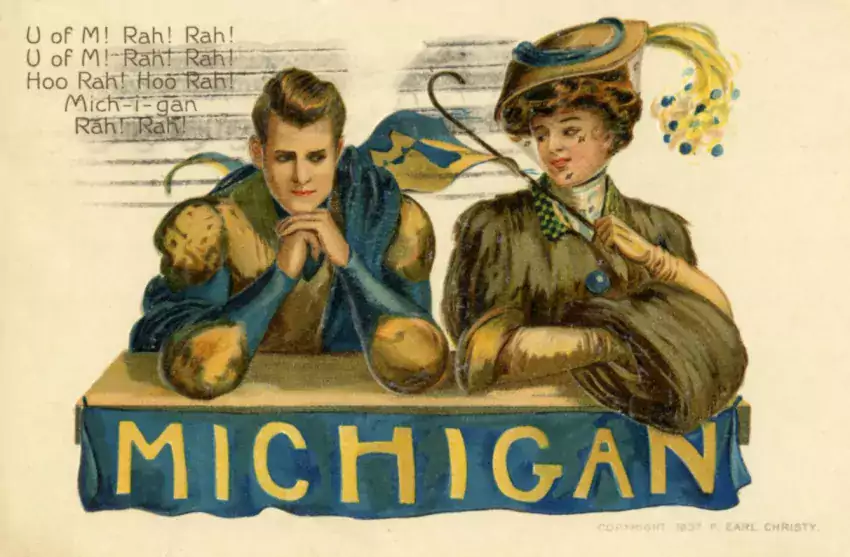
The Teams: 1901

3 hours, pretty much.
Michigan historian Dr. Sap and I have started a new podcast on the lore of Michigan football. This one got out of hand, just like everything else Yost touched when he arrived, largely thanks to the endless knowledge of "guest" (really, he hosted and we just listened most of the time) Toronto Sun NFL columnist John Kryk, author of Stagg vs. Yost: The Birth of Cutthroat Football.
The Sponsor:
It is sponsored by HomeSure Lending. If you're buying or refinancing your home, this is the guy to talk to. He'll work on your loan directly and walk you through a process that can get really confusing really fast. He did my loan, Brian's loan, and a lot of MGoBlog readers' loans.
--------------------------------------------
1. The Setup
(starts at 0:50)
Yost's contract (click for big), which is held at the UM Bentley Library
Yost's path to Michigan. The rules: five-point touchdowns, insane extra points that began with horizontal longsnaps, six men on the line of scrimmage, no passing. Most teams were built on the Yale system, which was all about burling your way forward at a few murderous yards per gain. Lots of rugby still in the game at this point.
2. Meet the Team
(starts at 24:19)
The 1901 team photograph, colored by unknown and color-fixed by Jason Kryk
Yost's tenants. QB Boss Weeks was the most terrifying 5'6 man in history. Everett Sweeley is my pick for greatest Michigan punter. FB Neil Snow was Jim Thorpe before Thorpe. Cap Redden and Albert Herrnstein two of the great ends; there's a memorial to Herrnstein in Illinois. Captain Hugh White built the Lincoln Memorial and the US Supreme Court Building. Dan McGugin is responsible for the SEC. Dad Gregory was small for a C and never saw a grade that high until he went to law school. Eben Wilson the tough nugget from EMU. Bruce Shorts nearly died.
3. The Season
(starts at 55:51)
- Albion. 50-0. Albion didn’t cross their own 45. Heston didn’t play until the 2nd half with the backups. Said Yost “That was easy.”
- Case. Daily Headline (via The Michigan Daily Archives):
Case showed up with their own ref (from Oberlin, who had a history with Michigan) and threatened to get back on their bus if they didn’t use their guy. Heston and Redden breakout party. Close call: Sweeley fumbled the snap and a Case guy got free, but Sweeley ran him down.
- Indiana. 33-0. Michigan’s weight was a concern, especially in a wet slog. No trickeration “with the exception of a lonely quarterback punt.” Only weakness in Michigan is defense
- Northwestern. 29-0 versus a contender. Defense held. Closest to giving up a score: NW 1st and goal at the 2. Northwestern would pull both guards into the same gap and try to plow downfield but Michigan’s D was shooting the gaps. The fans gave Northwestern a Rutgers cheer when they got an 8-yard gain. Two 50-yard runs by Heston. Yost as OBC.
- Buffalo. 128-0. Everyone had scored a TD but the center, Dad Gregory.
- Carlisle. 22-0. and Pop Warner. Played before 2,000 people in Detroit. First half M fumbles twice. The “move-over” play is used. Minister Wu is in the audience. Wu Tingfang, the Chinese minister.
- Ohio State. 21-0. Not yet The Game; Buckeyes start feigning injuries, Michigan starts making fun of Ohio State by falling down with the same injuries.
- Chicago. 22-0. The Game. Stagg was a cross between Joe Paterno and Bo Ryan, manipulating every rule to his benefit while cultivating this fiction that he was the angel.
- Beloit. 89-0. With Nebraska and Notre Dame this was one of the elite Midwest teams that couldn't get into the Big Ten because of academic elitism.
- Iowa. 50-0. Played in Chicago—Stagg scheduled his Wisconsin game atop them but it still drew 10,000 spectators.
4. The First Rose Bowl & Legacy
(starts at 2:02:43)
[Bentley]
Yost organized a Christmas game with Cal in San Francisco followed by Stanford in Pasadena. Not the first team to play out West: Stagg 1894. Charles Baird: recent former player became the first athletic director, but also had to deal with some faculty who were sure They were in charge of the athletic department—Baird was more day-to-day running of the show. Rose Bowl: Michigan sent just 15 guys—the starters, a few backups, Yost, and a manager. Good Yost story about how Stanford tried to throw in the towel. Stats: Did they score a point a minute? Most offense per game until the Run & Shoot Houston team. Is this season the reason Michigan is MICHIGAN?
MUSIC
- "Come Josephine in My Flying Machine"—Ada Jones & the American Quartet
- "Machine"—Regina Spektor
- "Extraordinary Machine"—Fiona Apple
- "A Toast to Yost from Coast to Coast"—1940 UM Glee Club (via)
- “Across 110th Street”
THE USUAL LINKS
- Helpful iTunes subscribe link
- General podcast feed link
- Direct download link (right-click/save-as)
- What's with the theme music?
Did you really coach four teams out there and they all won championships? No, I coached five teams and they all won championships.
February 26th, 2019 at 5:30 PM ^
Not surprisingly, this team is a favorite for me.
However, I do object to the use of the term "Rose Bowl" to describe the 1902 contest, which was played several decades before the Bowl in Pasadena was built.
February 26th, 2019 at 7:40 PM ^
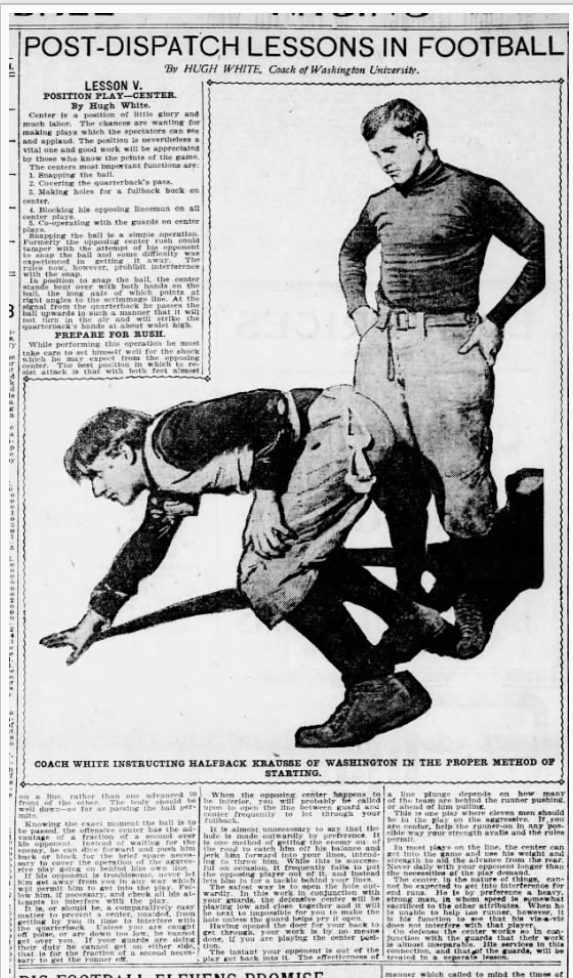 Speaking of Hugh White’s place in Yost’s coaching tree, here’s an article he wrote while he was coach at WashU.
Speaking of Hugh White’s place in Yost’s coaching tree, here’s an article he wrote while he was coach at WashU.
February 26th, 2019 at 7:41 PM ^
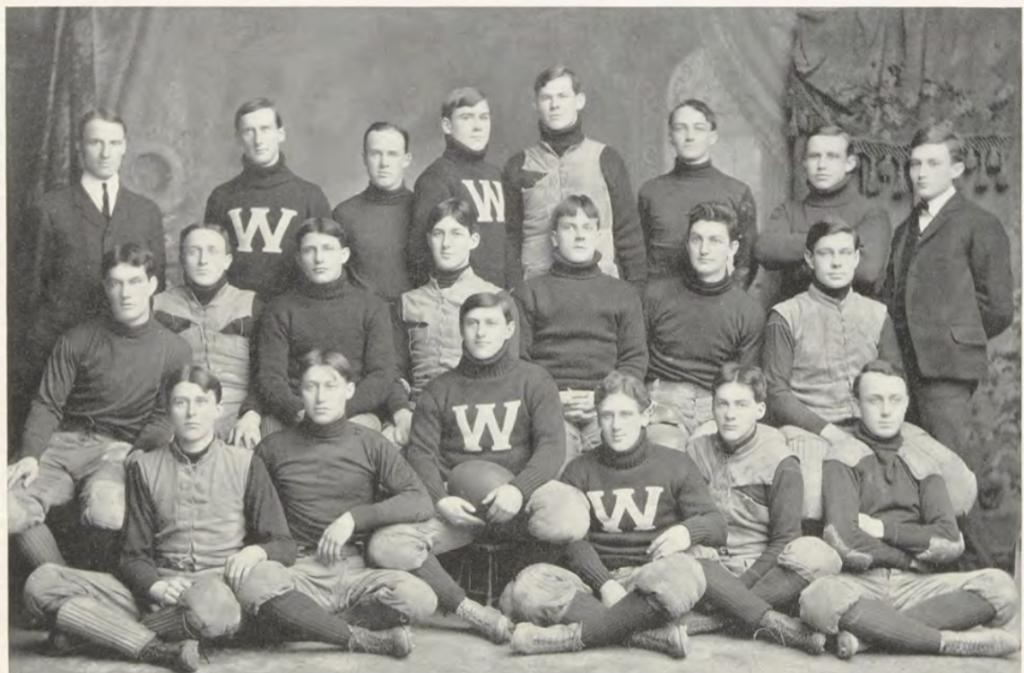 And a photo of Coach White and the WashU team.
And a photo of Coach White and the WashU team.
February 27th, 2019 at 12:02 PM ^
From the Rose Bowl's official site:
Known as the oldest of bowls, the Rose Bowl Game has kicked off myriad college football legacies. Since the first game in 1902, the game has showcased 17 Heisman Trophy Winners, produced 29 national champions, featured 199 consensus All-Americans and honored 107 college football legends by inducting them into the Rose Bowl Hall of Fame.
The first Tournament of Roses football game, which was the first post-season football game in the nation, was staged at Tournament Park on January 1, 1902. The game matched the West Coast’s Stanford against Midwestern Michigan. (The teams would later become members of today’s Pac-12 and Big Ten conferences, respectively.) Michigan routed Stanford, 49-0, prompting the football contest to be replaced with Roman-style chariot races inspired by the literary classic Ben-Hur. Football was permanently reinstated as part of the Tournament’s traditions in 1916.
February 27th, 2019 at 1:19 PM ^
Exactly. I prefer the term “Tournament of Roses Football Game” used in this excerpt, to avoid the anachronistic use of the word “Bowl” when describing the 1902 game.
February 26th, 2019 at 6:03 PM ^
I like that maize M with the laurel wreath.
February 26th, 2019 at 6:08 PM ^
This 1901 team, according to my extensive internet research, was composed almost entirely of 5* recruits. I am telling you this because I want to emphasize how good a team of 5* players can be when properly coached, and to simultaneously lament our current trend of recruiting players who are not considered 5* players by websites and scouting services.
February 26th, 2019 at 7:29 PM ^
No doubt Ye Olde Maizen was bitching about that recruiting class. Back when the message board was literally a board on the Diag people tacked paper to. Thick layers of Ye Olde Maizen posts:
"I fear that Mr. Yost cannot recruit as well as the good sirs who recruit for that august institution in Evanston."
"Fellows! How can we hope to beat Chicago with such a collection of ne'er-do-wells?"
"FIRE YOST!!!"
February 26th, 2019 at 8:51 PM ^
I think a t-shirt that says Fire Yost with Maizen's name underneath might be a hilarious big seller here at mgoblog. In fact, if they don't make one I am going to make one and wear it to a football game and see how many people crack up laughing.
February 27th, 2019 at 1:14 PM ^
"With this band of farmhand willy-yammers the the men of West Point will make cuckholds of us all!"
September 10th, 2020 at 11:02 AM ^
Rivals and Scout did not rate every Michigan recruit as 5*. Only ESPN had all but 1 as 5 star. Lemming started his recruiting service the year after. And 247 was a few years later.
Heston was a unanimous parade all-american though.
February 27th, 2019 at 12:01 AM ^
Great pod, astonishing info! Nice job providing the picture of Yost’s first contract for Michigan. That is literally the sports bargain of the 20th century. I challenge anyone here to find a topper to that.
February 27th, 2019 at 3:21 AM ^
Fun team to watch. That defense was true murder wolves! One of these years, I hope Harbaugh can have a similar season.
February 27th, 2019 at 9:05 AM ^
$2,300 in 1901 is the same purchasing power as approximately $70,000 today.
It appears there has been an inflation in coaching salaries.
February 27th, 2019 at 9:30 AM ^
I did a little google-research. In 1901/02, the average salary for a full professor at Princeton was $3160, and an average assistant professor was making $1774. Assuming Michigan paid a little less than Princeton, Yost was probably making almost what a full professor was making.
February 27th, 2019 at 9:27 AM ^
I think that dude in the opening image probably still posts here.
February 27th, 2019 at 10:45 AM ^
Yeah, I wasn't bad looking back then.
February 27th, 2019 at 10:48 AM ^
"...visitors start to take French leave..."
I had to look this up:
"A French leave is a departure from a location or event without informing others or without seeking approval. Examples include relatively innocuous acts such leaving a party without bidding farewell in order to avoid disturbing or upsetting the host, or more problematic acts such as a soldier leaving his post without authorization.
The phrase is first recorded in 1771 and was born at a time when the English and French cultures were heavily interlinked."
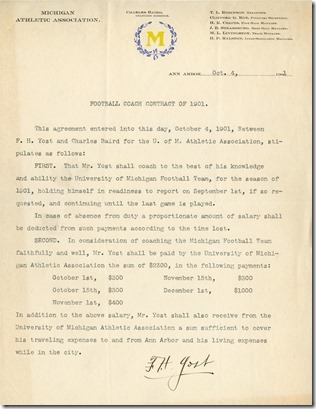
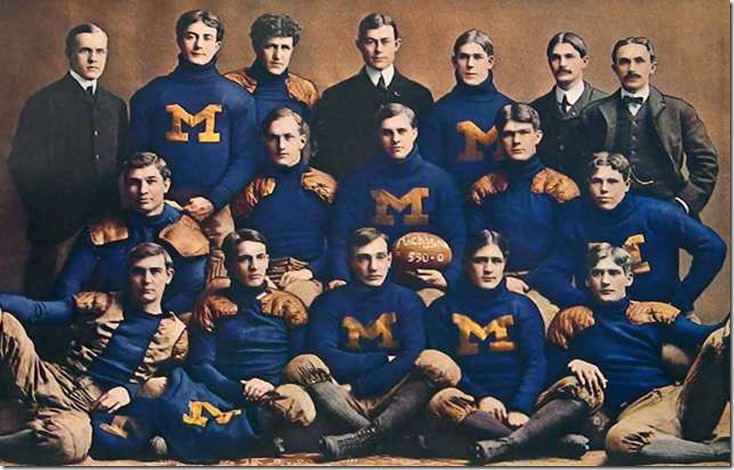
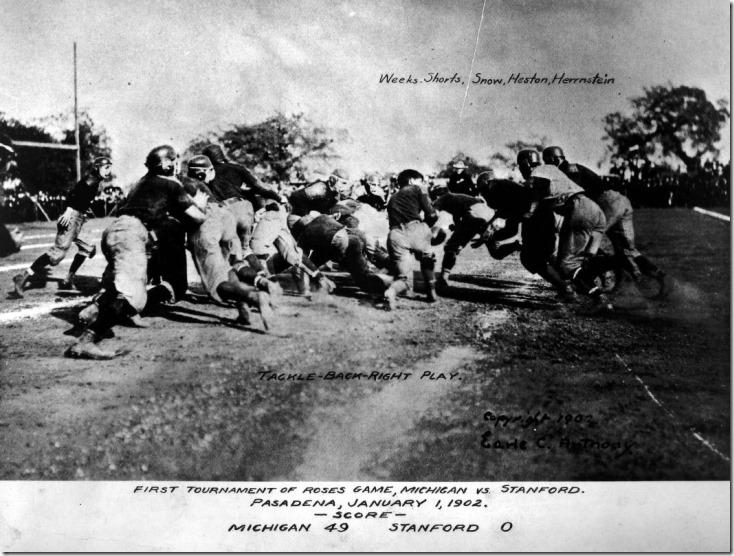
Comments